| A ‘Community of Scholars’: 2006 graduates step into their futures
Even as a major motion-picture crew filmed Emory’s 161st Commencement from the upper level of the Pitts Theology Library, the ceremony unfolded without any alien invasions or car chases—although there were a few tears, several dignitaries, and a cast of thousands.
The celebratory mood calmed as the Reverend Susan Henry Crowe 76T, dean of the chapel and of religious life, gave the invocation, urging graduates to “seek new horizons of service for humankind.”
President James W. Wagner then paid tribute to Emory’s 3,489 graduates.
“For most of your time at Emory, our nation has been at war. For us and for our country, Americans your age have fought and died in faraway places. In our own land, some of our fellow citizens have suffered devastating losses of homes and livelihoods from natural disasters. Both at home and abroad, the principles upon which our nation was founded have been put to severe and controversial tests.
“You here at Emory did not enjoy frivolously the blessings of peace at home and relative security from disaster. When you could, you gave aid to tsunami and Katrina victims. . . . You worked to build a community of scholars, of the mind, of intellectual inquiry and ethical engagement, of strength and diversity, a community of friendship. You pursued community with determination and a spirit of common goodwill—something I hope you can teach our generation and the rest of the world.”
After Wagner’s presidential address, student and faculty awards were presented and honorary degrees conferred. The first recipient of an honorary degree was Dietrich von Bothmer, one of the world’s leading archeologists and historians of ancient Greek and Roman art and chief curator at the Metropolitan Museum of Art in New York, who has supported the Michael C. Carlos Museum’s collection of Greek vase fragments. Von Bothmer was unable to attend owing to illness, and the honor was accepted by Carlos Museum curator of Greek and Roman Art Jasper Gaunt in his stead.
Also granted an honorary degree was Stephen B. Bright, president and senior counsel for the Southern Center for Human Rights, where he served as director from 1982 to 2005, for his accomplishments as an advocate, lawyer, and teacher. Bright has worked to ensure a right to counsel and to end racial discrimination in the criminal justice system, and he has taught courses on criminal law and capital punishment at Harvard, Yale, Georgetown, and Emory, among other universities.
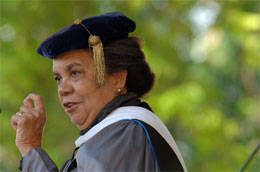 |
| Children’s Defense Fund Founder Marian Wright Edelman, keynote speaker, urges graduates to be selfless in service to others. |
Commencement speaker Marian Wright Edelman, noted author and founder and president of the Washington, D.C.-based Children’s Defense Fund, was given an honorary degree for her advocacy for children and their families. A graduate of Spelman College and Yale Law School, Edelman was the first black woman admitted to the Mississippi Bar. She founded the Washington Research Project, a public interest law firm and parent of the Children’s Defense Fund.
Edelman urged Emory graduates to work strategically for social justice, to protect the most voiceless and vulnerable, and to maintain America’s essential values.
“Something is out of balance and out of kilter in the world that we live in when just 691 billionaires have wealth that is equivalent to three billion people living in our eighty-nine poorest developing countries. About 347 are in the United States,” she began. “We have the highest debt in our history, the highest trade and budget deficits in our history, and the gap between the haves and have-nots is the largest since we have been recording them.”
Edelman asked graduates to help redefine success in the twenty-first century, adjusting their attitudes and expectations to ask “not ‘How much can I get?’ but ‘How much can I do without and share?’
“Service is the rent one pays for living. It’s the very purpose of life, and not something you do in your spare time or after you’ve reached your personal goals,” she said.
Wright shared anecdotes from her own childhood in rural South Carolina, growing up as the daughter of Baptist preacher Arthur Wright, and her college years at Spelman in Atlanta, where she heard leaders such as Martin Luther King Jr. and Howard Thurman speak.
“All had a single message, which was the message of my parents: Those of you who are educated are obligated to give back and make the world better.
“I was fourteen the night my daddy died with holes in his shoes. He had two children who’d graduated from college, another in college, another in divinity school, and a vision he was able to convey to me even dying in an ambulance—that I, a young black girl, could do and be anything, that race and gender are shadows, and that character, self-discipline, determination, attitude, and service are the substance of life. I want to convey these same messages to you graduates today, as you graduate into an ethically polluted nation and world. . . . We will never give up until America takes care of every one of its sacred children.”
Wagner conferred degrees upon the 2006 graduates to cheers and clusters of clapping as a few colorful beach balls bounced through the crowd. Graduates were welcomed into the ranks of Emory alumni, now nearly one hundred thousand strong, by Association of Emory Alumni president Andrea Casson 88B 93MBA.
Then, for the first time since 1977, Wagner asked the crowd to stand and sing Emory’s Alma Mater, written by J. Marvin Rast 1918C and led by Jeremy Wirths 06G: “In the heart of dear old Emory, where the sun doth shine, that is where our hearts are turning, round old Emory’s shrine. . . .”
With the words still hanging in the cool air, many of the new graduates left for their individual school ceremonies, a quick lunch, and on to whatever their futures may hold.
The Marion Luther Brittain Service Award
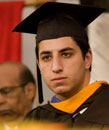 |
| Feras Akbik |
From his first year at Emory, Feras Akbik 06C (below) began changing the University by creating new traditions, overhauling the College Council, and fostering discussions of race and religion on
campus.
A double major in biology and philosophy, Akbik was a Goodrich C. White Scholar. As vice president, then president, of the College Council, he represented the concerns of more than six thousand undergraduates to Emory’s administration and oversaw the distribution of more than $300,000 in grants that funded student-run events. During his tenure, he started new events such as the Great Debate lecture series, Battle of the Dorms, and Screen on the Green.
Described as “a person who cares deeply about the college experience for students here,” Akbik earned the highest student honor, the Marion Luther Brittain Service Award, which includes a $5,000 gift.
“College is as much about developing as a person as it is about academics,” Akbik said. “By getting involved, you learn a lot of different life lessons you wouldn’t learn in the classroom.”
Akbik, who is from Atlanta, worked closely with the Muslim Student Association (MSA), planning events that furthered an understanding of Islam, including the first MSA art gala. He planned the sixth-annual “State of Race Debate” on the topic of the portrayal of Arabs in the media. He also founded the Kappa Sigma fraternity chapter at Emory. His community work included teaching science classes at an Atlanta public school and working as a tutor with at-risk youth.
Akbik plans to attend Washington University in St. Louis to pursue a career in medical research.
Lucius Lamar McMullan Awards
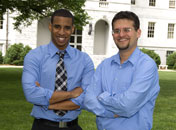 |
| David Murphy (left) and J. B. Tarter shared the McMullan award. |
In an unprecedented decision, the Lucius Lamar McMullan Award this year was granted to two students—J. B. Tarter 06C and Devin Murphy 06C—for their individual and collective service to the University.
The duo has been called both a “study in contrasts” and “joined at the hip” in their dedication to furthering the common good while at Emory.
Tarter, who graduated with a bachelor’s degree in political science, economics, and history and a master’s in political science, and Murphy, who gained a bachelor’s degree in interdisciplinary studies in society and culture, inhabit opposite ends of the political spectrum and admit they “don’t agree on much.”
But they do have a lot in common. Both were Robert W. Woodruff scholars, were elected to Phi Beta Kappa, and were leaders in nearly every group they joined, including the Emory Scholars Program. They first got to know each other when they were paired together their freshmen year as partners in Emory’s nationally ranked debate program, the Barkley Forum.
Murphy, who was actively involved in student government, also served on two commissions that advised Emory President James Wagner about issues of race and ethnicity, and about lesbian, gay, and transgender concerns. He volunteered with the Urban Debate League in Atlanta and worked with local middle-schoolers on computer-assisted debating.
Tarter was a member of the College Republicans, student government attorney general for three terms, and the student member on Emory’s Center for Ethics advisory board. He has served as the Senator Sam Nunn Presidential Fellow at the Center for the Study of the Presidency and had internships at the Heritage Foundation and in two Senate offices.
Murphy and Tarter were summoned together to the dean’s office before graduation to be told about the McMullan Award, which comes with an award of $20,000 each.
“We knew it had to be either really good or really bad,” said Murphy. “We had no idea what to expect.”
They plan to use the money to help fund their graduate careers: Murphy, who intends to become a professor and ultimately a university provost, will go to New York University to study for a doctorate in American studies; Tarter, who has political aspirations, will attend Harvard law school.
2006 Faculty Awards
The University Scholar/Teacher Award this year went to Frances Smith Foster, Charles Howard Candler Professor of English and Women’s Studies. Foster, chair of the English department, is former director of the Institute for Women’s Studies at Emory. A top scholar in nineteenth-century African American literature, Foster has authored more than a dozen books, is an editor of the Oxford Companion to African American Literature, and has defined the field of early nineteenth-century African American women’s literature.
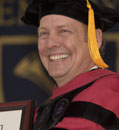 |
| Frank Alexander |
Professor Frank Alexander of Emory Law School received the Thomas Jefferson Award for significant service to the University. Alexander has been a member of the law school faculty since 1982, founded the Law and Religion Program, and is director of the Project on Affordable Housing and Community Development. He teaches property, real estate sales and finance, state and local government law, law and theology, and housing policies.
David F. Bright, professor of classics and comparative literature, received the George P. Cuttino Award for Excellence in Mentoring.
The Emory Williams Awards for Distinguished Teaching were presented to: Associate Professor of Classics Peter Bing, Associate Professor of Mathematics and Computer Science Eric Brussel, Professor of Educational Studies Frank Pajares, Professor of English Lucas Carpenter, Assistant Professor of Organization and Management Henry Moon, Nell Hodgson Woodruff School of Nursing Instructor Corrine Abraham, and Professor of Law Howard Abrams.
Oxford Commencement 2006
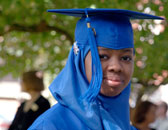 |
| Oxford graduate Halima Garbo 06Ox of Stone Mountain will continue to Emory. |
The thin blue line of Oxford College graduates processed solemnly through the Temple of the Trees, just as graduates have done near that very spot for more than one hundred and sixty years.
The Commencement ceremony on May 6, the first to be overseen by Oxford Dean Stephen Bowen, honored 289 graduates.
“It seems like even the weather is celebrating the accomplishments of these students today—the singing birds, the whispering trees, the cool temperatures, make our hearts soar,” said Oxford Chaplain Judy Shema, who led the invocation.
Appropriately, rites and rituals were the theme of the day, made manifest not only by the ceremony itself but by commencement speaker Marshall Duke, Charles Howard Candler Professor of Psychology at Emory.
“Let me begin with a confession—I love commencement. I love the traditions, the bagpipe, the pageantry. . . . It signifies that something special is happening,” said Duke, a faculty fellow at Emory’s Center for Myth and Ritual in American Life, who told graduates he has attended thirty-six Emory commencements. “Rituals may be thought of as gateways between one condition in life and another . . . at the very point of transition.”
Just as rituals connect graduates one year to the next, and one generation to the next, so too does a sense of place, said Duke.
“Oxford is a place with which you have a relationship. A place you can love, be angry with, lean upon, wish to leave, wish to stay. It is a place you can carry with you, think back upon, and long for. You have been nurtured in the warmth of this campus,” he says. “The Seney bell will silently sound every thirty minutes in your hearts.”
Graduates who advance to the Atlanta campus, said Duke, will become living bridges between Oxford and Emory. He urged them to take a moment to stand before the Haygood-Hopkins gate at the University’s main entrance, honoring former Emory presidents Atticus Greene Haygood 1859C and Isaac Stiles Hopkins 1859C.
“Those two pillars joined together by a delicate steel span . . . serve to cement the ‘old’ Emory to the ‘new,’ ” he said. “They ensure and strengthen the relationship to those who began this great institution, on this spot, in 1836.”
Dean for Campus Life Joe Moon presented the Virgil Y. C. Eady Sophomore Service Award to Marlon Rhine, a student government senator, orientation leader. Rhine was a member of Leadership Oxford, Dooley’s spokesperson, intramural soccer champion, and guitarist at events such as a tsunami relief benefit and Peruvian orphanage fund-raiser.
“Marlon willingly came early and stayed late to support campus events,” said Moon.
Dean of Academic Affairs Kent Linville presented the Emory Williams Award for Distinguished Teaching to Charles Howard Candler Professor of English Lucas Carpenter for his “innovative and effective teaching strategies and for encouraging students to think independently.”
Carpenter, who has taught at Oxford for two decades, holds the first endowed chair at the college and was the first Oxford professor to be honored with Emory’s University Scholar/Teacher Award in 2003.—M.J.L.
The Eagle Has Landed:
Emory Weekend salutes alumni young and old
From Thursday to Monday, Oxford to Midtown, and every corner of the University in between, Emory Weekend 2006 brought together the entire Emory community to send off the 2005–2006 academic year—and the Class of 2006—in great style.
“We had a perfect blend of alumni, graduating students, family, friends, and even Emory faculty, staff and administrators,” said Gloria Grevas, assistant director of programming for Emory Weekend and reunions. “This was our third Emory Weekend and the most successful one yet. We’ve gotten a lot of positive feedback so far. Not only were we able to reconnect alumni to the University, but I think we also instilled a lot of Emory pride in our new graduates.”
Beginning on Thursday afternoon with an Emeritus College award ceremony and a reception for Oxford College continuees, and running through Commencement Monday, the Emory campus buzzed with activity.
The theme of Emory Weekend 2006, “The Eagle Has Landed,” took wing Saturday, May 13, at the Block Party on McDonough Field. The event marked the campuswide debut of Emory’s newly outfitted mascot, Swoop. Block Party emcee Tony Ciccone, who doubles as assistant coach for Emory’s women’s basketball team, first lauded the aged, retiring Swoop and showered him with going-away gifts (including an Emory rocking chair).
Ciccone then introduced the new Swoop, who rode onto McDonough Field on the back of a golf cart waving an Emory flag. After exchanging greetings with the old Swoop, the new Swoop fired t-shirts into the crowd and cavorted with young and old alike before concert headliner Guster took the stage for their 90-minute set.
With an estimated 1,800 attendees, including a raucous core of several hundred Guster fans packed together near the stage, the Block Party was the largest single event of Emory Weekend.
The Friday night soiree drew some eight hundred graduating seniors to the Emory Conference Center—many of them graduating students with their families—for a night of dancing.
Some of the smaller gatherings were no less enjoyable. The GALA (Gay and Lesbian Alumni) Blue Jean Brunch on Sunday was a perfect blend of alumni, students, staff, and faculty; also on Sunday, the Classical Concert featuring Emerson Professor of Piano William Ransom, several alumni performers and nearly a hundred guests and was an artistic highlight; and President Wagner was seen all over campus, hosting an open house at Lullwater, mingling with guests at a Town Hall meeting, and toasting the Class of 2006 at the Soirée.—E.R.
Golden Years:
Class of 1956 celebrates reunion
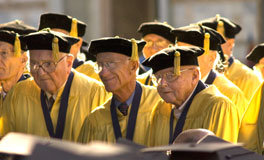 |
| The Golden Corps. |
The weekend of Commencement was also special for the seventy classmates of 1956 who returned to Emory for their fiftieth reunion.
Saturday evening, they gathered at Miller-Ward Alumni House for a champagne buffet dinner, slideshow, trivia game, and a night of shared memories.
“Much of our chat was about Emory in 1956 and how much it has changed,” said Mary Emma McConaughey of Atlanta, who chaired the reunion with Marshall Binford. “Then, most of the students came from small towns in Georgia. It was a small liberal arts college where you could get an excellent education and had a wonderful esprit de corps. We all agreed that Emory can no longer be classified as a provincial school, but has become a world-class institution.”
Sunday morning, they returned to Miller Ward bright and early for a breakfast and Medal Ceremony, where each inductee received the heavy gold medallion symbolizing their membership in Corpus Cordis Aureum, the Golden Corps of the Heart. For the third year, members of Corpus Cordis Aureum were invited to march in the commencement procession, a reminder to new graduates of Emory’s distinguished history.
“I know in some ways, it must be rather startling to see the change and growth taking place here,” Johnnie Ray, senior vice president for Development and University Relations, told the group. “But take comfort in knowing that the more Emory changes, the more it stays the same. The core values have not changed at all.”
One member of the class of 1956 was welcomed with special warmth: Nils Tvedt 56B, who came from Norway with his brother, Karl, was determined to be the class member who traveled farthest for the reunion weekend.
Tvedt came to Emory on a Rotary scholarship. After graduating, he worked in shipping in Savannah and then Houston, Texas, before returning to Norway to teach and eventually become dean of Norwegian Maritime College. Following Emory Weekend, he and Karl had plans to go and visit a former roommate in Savannah. It was Karl’s second visit to Emory; the first was to see Nils graduate in 1956.
“We feel strong ties to Emory,” Nils said. “We still come and go, not only physically, but emotionally.”—P.P.P.
TOP
|